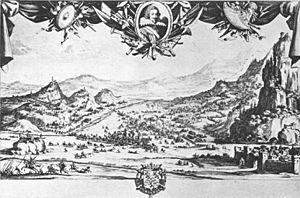Battle of Veillane facts for kids
Quick facts for kids Battle of Veillane |
|||||||
|---|---|---|---|---|---|---|---|
| Part of War of the Mantuan Succession | |||||||
 The Battle of Avigliana by Jacques Callot |
|||||||
|
|||||||
| Belligerents | |||||||
| Commanders and leaders | |||||||
| Henri II de Montmorency | Carlo Doria | ||||||
| Strength | |||||||
| 10,000 to 12,000 | 18,000 | ||||||
| Casualties and losses | |||||||
| 400 killed and wounded | 1,000 killed and wounded | ||||||
The Battle of Veillane (also called the Battle of Avigliana) was an important fight that happened on July 10, 1630. It was part of a bigger conflict called the War of the Mantuan Succession. In this battle, the French army, led by Henri II de Montmorency, fought against a Spanish army commanded by Don Carlo Doria. The French won this battle.
Contents
Why the Battle Happened
The Battle of Veillane was part of the War of the Mantuan Succession. This war was about who would rule a small but important area in Italy called Mantua.
Cardinal Richelieu's Plan
Cardinal Richelieu, a powerful leader in France, sent a French army into a region called Savoy. His main goal was to make sure France had a say in who became the next ruler of Mantua.
He also wanted to weaken the Habsburgs. The Habsburgs were a very powerful family who ruled large parts of Europe, including Spain and areas in Germany. They had a land route connecting their different territories. Richelieu wanted to break this connection by forcing the Duke of Savoy to stop being their ally.
The Fight Begins!
The battle took place near a town called Avigliana. The French army was smaller, with about 10,000 to 12,000 soldiers. The Spanish and their allies had a larger army of about 18,000.
Montmorency's Brave Charge
The French commander, General Montmorency, showed great courage. He personally led a charge of his best cavalry, called the royal gendarmes. They bravely crossed a ditch to attack the enemy.
During the intense fighting, Montmorency even captured the Spanish commander, Don Doria, himself! Reports say he fought like a regular soldier, not just a general, until the Spanish army started to retreat.
Battle Results
The French victory was clear. They caused about 700 casualties (killed or wounded) to the Spanish and their allies. They also captured around 600 enemy soldiers. The French had fewer losses, with about 400 killed or wounded.
What Happened After the Battle
Even though the French won at Veillane, the city of Mantua was captured by Savoy and its allies a week later. However, the French victory still had big effects.
French Successes
After this battle, the French were able to lift the siege of Casal, which meant they saved that city from being captured. They also took control of another important place called Saluzzo.
For his amazing leadership and bravery during this campaign in Piedmont (the region where Veillane is), General Montmorency was given a very high honor. He was made a Marshal of France later that same year.
A Good Outcome for France
Overall, the Piedmont Campaign, with the Battle of Veillane as a key part, helped France gain an advantage. The Treaty of Cherasco, signed in 1631, ended this part of the war. This treaty was mostly good for France, helping them achieve their goals in the region.

